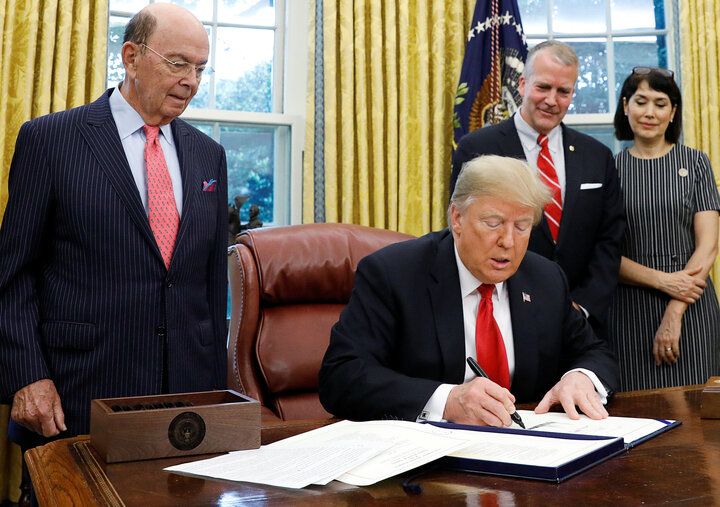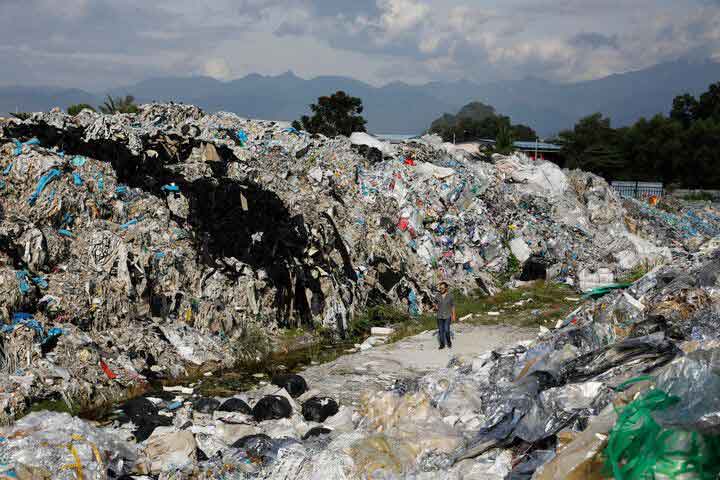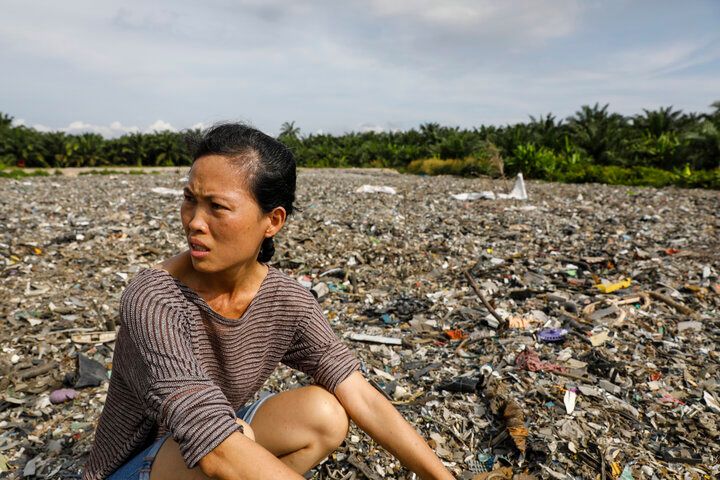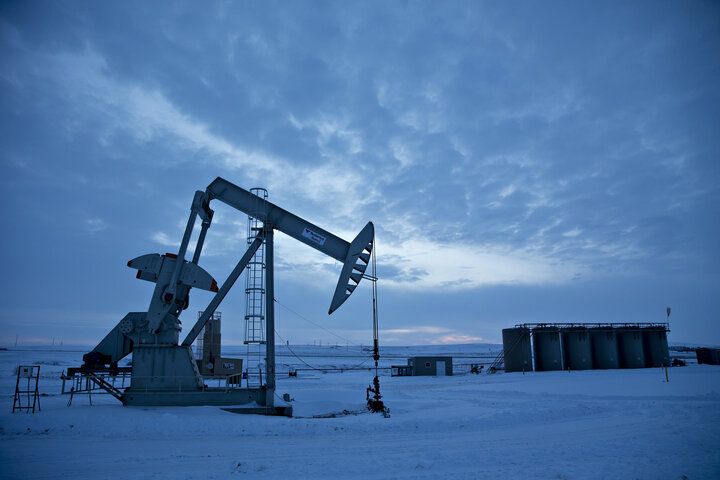When President Donald Trump signed the bipartisan Save Our Seas Act into law last October, he painted a grim picture of just how dire marine plastic pollution had become.
“Every year, over 8 million tons of garbage is dumped into our oceans,” he declared. “This waste, trash and debris harms not only marine life, but also fishermen and coastal economies along America’s vast stretches.”
However, the Trump administration has refused to recognize America’s role in the ocean plastic crisis and has repeatedly tried to stymie international efforts to tackle the problem, while boosting the plastic industry at home.
Trump has blamed “many countries of the world” for the marine plastic problem, calling out China and Japan by name. “The bad news is [this garbage] floats toward us” from “other countries very far away,” the president said last year, adding that the U.S. is then “charged with removing it, which is a very unfair situation.”
While it is true that Asia is the source of an estimated 80% of marine plastic pollution, what Trump failed to mention was that most of it doesn’t actually originate there.

KEVIN LAMARQUE / REUTERS
President Donald Trump signing the Save Our Seas Act in the Oval Office on Oct. 11, 2018.
“It’s an uncomfortable fact that ... the vast majority of the waste in these Asian countries that are ending up in the oceans actually come from the U.S. and Europe,” David Azoulay of the Center for International Environmental Law said from Geneva on Thursday.
The U.S., which is one of the world’s largest producers and consumers of plastic, is also the No. 1 exporter of plastic scrap.
For decades, it sent much of this waste to China, which had processed about 45% of the world’s plastic scrap until it decided in 2018 to bar most of these imports. As a result, China’s Southeast Asian neighbors have been deluged with American plastic waste. Unlike China, however, countries like Indonesia, Malaysia and Vietnam have neither the infrastructure nor the resources to properly handle this onslaught.
As a HuffPost investigation uncovered earlier this year, bales of plastic trash from countries like the U.S., U.K. and Australia are being illegally dumped or burned across Southeast Asian countries. Local activists in Malaysia said at the time that the U.S. and other wealthy nations were using the region as a “dumping ground.”

JOSHUA PAUL FOR HUFFPOST
A Greenpeace activist at a dumpsite in Ipoh, Malaysia, on Jan. 30. Unlicensed recyclers are illegally burning or dumping waste plastics at sites across the country.
Yet, despite Americans’ contribution to the global plastic waste crisis ― and despite the recent efforts of most of the world’s governments to develop solutions to address it ― the Trump administration has chosen to take an “obstructionist” stance on this issue, activists say.
The U.S. is “very clearly isolating itself from the rest of the world on this issue,” said Azoulay, who directs CIEL’s environmental health program.
Just last week, the U.S. was accused of attempting to undermine a landmark Basel Convention proposal to control the flow of plastic waste to developing countries ― a set of rules that would shut the U.S. off from many of the countries where it currently ships its plastic scrap.
“It was another clear example of the U.S. playing an obstructive role in international negotiations,” Von Hernandez, global coordinator for the Break Free From Plastic initiative, said on Tuesday, speaking from the Philippines. “This has long been their playbook for anything to do with the plastic waste trade; they obfuscate the issue, they try to delay the process.”
On Friday, 186 countries and the European Union — all parties of the 1992 Basel treaty, which controls the transboundary movement of hazardous waste between nations — signed a legally binding agreement to track and limit the trade of lower-quality, mixed and contaminated plastics. These materials are typically difficult or impossible to recycle and are the plastics that often end up in landfills or polluting waterways. They also make up the vast majority of the plastic scrap exported by developed countries to poorer ones.
The U.S. is one of two countries that signed but never ratified the Basel treaty ― and, as such, was not among the countries that signed on to the new agreement, dubbed the Norwegian amendment after the country that first proposed it. That didn’t stop the American delegation from rabble-rousing, however.
There was an overwhelming consensus in support of the amendment, an unusual scenario for international agreements of this kind, according to Hernandez, Azoulay and Jim Puckett, founder of the Basel Action Network, who were all in the room during the Basel negotiations last week. Even countries that have historically been antagonistic to plastic waste regulation, like Japan and Canada, backed the proposal.
There was just one tiny faction of countries that opposed the amendment, they said. The U.S. was vocal in its opposition, they noted. The others were Argentina and Brazil, neither of which export very much plastic scrap; the South American duo appeared to parrot the U.S. line.
“The U.S. delegation’s argument was the same argument we always hear from them: ‘We need more time, we cannot make a decision now, we need more data,’” Hernandez said. “You could tell that other parties were frustrated by their behavior.”
It’s done !!🥳🥳 with the décision adopted today by @brsmeas COP we have completely restructured the global plastic waste trade. @ciel_tweets @ToxicsFree @GENetwork @ToxicsFree @brkfreeplastic @aplastic_planet pic.twitter.com/HysL2JR487
— David Azoulay (@Davzoul) May 10, 2019
Puckett estimated that about 90% of the plastic exported to developing countries is mixed or contaminated. Under the new agreement, which will come into effect in January 2021, parties to the convention that wish to export most mixed and contaminated plastics will first need to obtain consent from the receiving nations.
Puckett described the new rules as “historic” and one of the convention’s greatest achievements to date.
The regulations, he said, are expected to have a profoundly positive effect on the plastic waste and recycling industry worldwide. There will be more transparency to what has historically been the very opaque international trade of plastic scrap. Recyclers in wealthy nations will be compelled to improve their sorting practices, which is expected to increase the rate that plastics are actually recycled. (Since 1950, the plastic waste recycling rate has been an abysmal 9% globally.)
The measures are also expected to significantly reduce the amount of contaminated plastics flowing into Southeast Asia, Africa and other developing areas ― and, in turn, slash the amount of marine plastic pollution originating from these nations.
It’s not hard to imagine why the Trump administration would oppose the Norwegian amendment. Hernandez said the U.S. has long opposed the Basel Convention and has a terrible track record when it comes to regulations related to waste of any kind.
Plus, he noted, the new rules are expected to hit the U.S. especially hard.
According to recent estimates by industry publication Resource Recycling, the U.S. currently exports at least 80% of its mixed plastics. Since the U.S. has not ratified the Basel Convention, however, developing countries that are parties to the treaty will no longer be able to accept most mixed plastics from the U.S. under the new rules.
“As a nonparty, the U.S. won’t be allowed to trade with parties” except for the members of the Organization for Economic Cooperation and Development, Puckett explained, noting that OECD members are mostly high-income economies known more for exporting plastic scrap than for importing it.
“The United States has been exporting so much of its scrap [to developing countries],” Puckett said. “They’re going to have to figure out something very different” after 2021.

A Malaysian activist checks out an illegal plastic dumping site inside a palm oil estate in Kuala Langat. Shredded plastic was spread on the ground and left here. Often, the dumpers will return and burn the piles at night.
Under Trump, a self-declared anti-globalist, the U.S. has increasingly been steered onto an isolationist path. It’s distanced itself from traditional trade partners and allies, has pulled out of international treaties like the landmark Paris climate change agreement and now, on the issue of plastics, has emerged starkly as a global outlier ― one that, according to activists, has attempted to dismantle the progress that other nations have made in this area.
Azoulay said this American separateness and antagonism was particularly obvious at a United Nations Environment Assembly (UNEA) meeting held in Kenya in March. During that meeting, almost all countries agreed to a proposal calling for U.N. members to phase out “most problematic single-use plastic products by 2025.” The U.S., with the support of Saudi Arabia and Cuba, however, took issue with this pledge and ultimately succeeded in watering down the language of the commitment to say only that countries would aim to “significantly reduce” single-use plastics by 2030.
According to Azoulay, who attended the Kenya meeting, the U.S. also played a “very strong obstructionist role” during discussions about broader frameworks related to marine litter and microplastics. “Again, the U.S. was a very lonely voice opposing the [plastic proposals] at UNEA,” he said.
Azoulay, a veteran attorney of environmental law, said he’s never seen the world’s nations as united over an issue as they appear to be regarding plastic waste.
“Today, if you look at those international gatherings, almost all countries are supporting tighter controls of plastic and they’re moving very fast,” he said. “In my whole career, I’ve never seen any international regulation move as fast.”
“Since there’s such a wide consensus,” Azoulay added, America’s opposition appears even “more radical.”
Observers have suggested that Trump’s chummy relationship with the fossil fuel industry, as well as influence from the American recycling lobby, could be a root cause of the administration’s hostile position.
Plastic production had been ramping up in the U.S. even prior to Trump’s ascent to the presidency. In 2015, the American Chemistry Council, an oil and gas trade association, declared that a plastics “renaissance” was underway in the U.S.

GETTY EDITORIAL
A pump jack operating as a drill rig sits on a well pad in the Bakken Formation in Williston, North Dakota, on March 8, 2018. Ninety-nine percent of the world’s plastics are produced from chemicals sourced from fossil fuels.
Trump’s support of natural gas and other fossil fuels has further boosted America’s plastics industry, according to Azoulay and others.
As a 2017 CIEL reports detailed, 99% of the world’s plastics are produced from chemicals sourced from fossil fuels, and the “availability of cheap shale gas in the United States is fueling a massive wave of new investments in plastics infrastructure in the U.S. and abroad, with $164 billion planned for 264 new facilities or expansion projects in the U.S. alone,” the report said.
If this investment is spent in the way that it’s intended, CIEL said, virgin plastic production is slated to increase by 33%-36% in the U.S. by 2025.
“With the current administration relying so much on a good relationship with the fossil fuel industry, you can see a pattern in their [international] negotiations ― they oppose any source of restriction or anything that would result in a tighter control on plastic, whether virgin plastic production or plastic waste,” Azoulay said. “Their policy line at this point is, basically, don’t touch the plastic industry and let them deal with these issues themselves.”
U.S. politics has for decades been heavily influenced by the fossil fuel industry, ― and the country has historically been known for its generally anti-regulatory stance in the global arena. But Jesse Bragg of the Boston-based nonprofit Corporate Accountability International said the Trump administration has been unique in its strident approach.
Even the Obama administration, which positioned the U.S. as an environmental leader and the country that spearheaded the Paris agreement, has been accused of weakening global environmental agreements, Bragg said, noting that “if you speak to most developing countries, they’ll tell you the reason the Paris agreement is as weak as it is, is because of the U.S.” But the Obama White House took pains to obscure this side of the negotiations.
The Trump administration, on the other hand, appears to have “less interest in hiding their true intentions,” Bragg said. “It doesn’t take much to see what they’re doing ... and that’s a big departure from past administrations. The Trump administration doesn’t care what the world thinks.”
This attitude, Bragg warned, is a “dangerous place to be.”
“If they don’t care what their international reputation is, there’s nothing keeping the administration from continuing the obstruction that has been the [U.S.] trend for decades,” he said, “and they can operate in some dangerous ways to advance the financial interest of those in the administration ― and those supporting the administration.”
This story is part of a series on plastic waste, funded by SC Johnson. All content is editorially independent, with no influence or input from the company.
Article originally posted in Huffpost.



